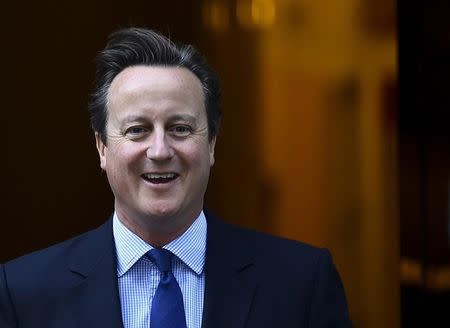One in five of PM Cameron's lawmakers may favour "Brexit"-lobby group

By Guy Faulconbridge and Kylie MacLellan LONDON (Reuters) - As many as one in five of British Prime Minister David Cameron's lawmakers is likely to vote to leave the European Union in a referendum, research showed on Friday, with the "Brexit" issue likely to dominate the party's annual conference next week. Cameron has promised to renegotiate Britain's EU ties ahead of a membership vote by the end of 2017. He favours staying in a reformed EU but has said he will rule nothing out if he cannot get changes, including curbs on welfare payments to EU migrants. Splits over Europe have long plagued Cameron's party, contributing to the downfall of the last two Conservative prime ministers, Margaret Thatcher and John Major. Ahead of next week's party gathering, research from the London-based Open Europe think-tank, which lobbies for EU reform, showed that out of 330 lawmakers, 69 are either "firmly out" or "out leaning" while 203 could vote either way. The research, based on public statements and voting on EU issues, showed just 14 lawmakers were firmly for staying in the EU and 44 were leaning towards staying in. Eurosceptic lawmaker Steve Baker, co-chairman of the Conservatives for Britain group, which plans to push for exit if Cameron does not get a better deal, said the numbers were fairly accurate but many of the undecided would later switch to "out". "If we go down the current path where the government is asking for very little and therefore will come back with very little ... I would be amazed if a majority of Conservative MPs don't campaign to leave," he said. "The prime minister has said he wants fundamental change ... we need to carry through things we say to the public, so I would hope if the renegotiation position is as thin as it currently looks like is going to be, the government recommend we leave." Open Europe said 12 out of 21 members of Cameron's cabinet were undecided, with five leaning towards out and four leaning towards staying in. A second Eurosceptic Conservative lawmaker, who declined to be named, said there was an understanding within the party that it had to give Cameron a chance. "If the negotiations are as people fear, they are going nowhere, then he has got a real problem on his hands. It is at that moment that we get that information that the prime minister's position becomes fair game," he said. Though the Open Europe research is an assessment, it is one of the first publicly available indications of lawmakers' views. "The problem for Cameron is what it will take to persuade them he has got a deal that is worth having," said Tim Bale, Professor of Politics at Queen Mary University London. "Their calculations will be based partly on the deal that Cameron gets and partly on what they think the consequences of losing that referendum would be for the government." (Editing by Louise Ireland)

